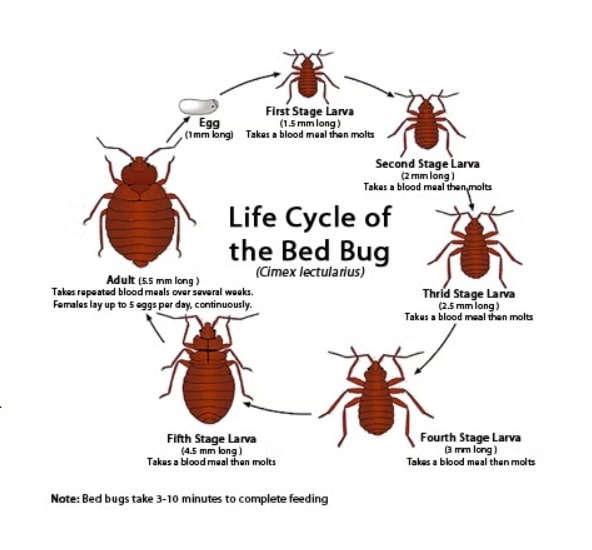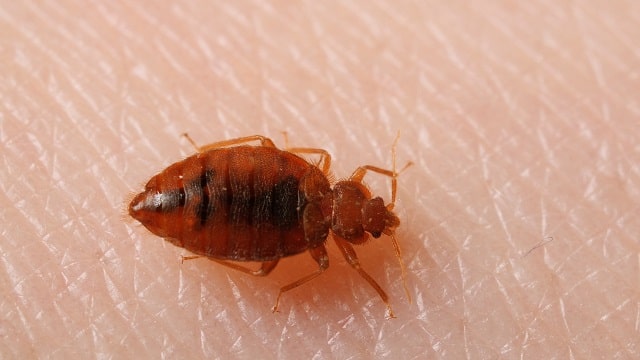What Are Bedbugs?
Bedbugs or bed bugs are small insects that live by sucking blood.
These animals are also called bed bugs because they often hide around the bed, mattress frame, or other areas around the mattress.
Bedbugs usually come out at night to bite and suck the blood of sleeping people. After a while, these animals will have had enough and quickly leave.
These lice have small bodies, reddish brown in color. Because their presence is often unknown, maintaining the cleanliness of the bed and room is something that needs to be done.
Bedbugs can be eradicated by washing sleepwear, blankets, and sheets in hot water.
However, for maximum results, dealing with lice can be done by using the services of a professional insect exterminator.
Symptoms of Bed Bug Bites
Bedbugs come out at night to bite people while they are sleeping. Bedbug bites cause reddish welts to appear on the surface of the skin.
The bitten area will also feel itchy or sore like a burning sensation. Bed bug bites often appear on the face, neck, arms, and hands.
Bed bug bites may not cause or may be late in triggering itching in a person.
This can happen because these insects release small amounts of anesthetic (a type of anesthetic) into the body of the person who is bitten.
So the itching will appear after a while and if scratched, it increases the risk of secondary infection which can cause swelling and bleeding.
In addition, some people also have good immunity, so they do not react to tick bites.
For some people, bed bug bites can cause an allergic reaction, causing severe itching, blisters, or hives.
Intense bed bug bites can lead to secondary skin infections in severe cases.
Life Cycle Of The Bed Bugs

Causes of Bedbugs
The causes of bed bugs can be associated with:
- International and domestic travel;
- Changes in pest control practices;
- Insecticide resistance.
Bed bugs don’t care about clean or dirty environments. They need a warm place and a hiding place.
Bedbugs Risk Factors
Factors that increase the risk of bed bug infestation are places that have high mobility of changing occupants, such as:
- Apartment complex;
- Dormitory room;
- Homeless shelter;
- Hotel;
- Cruise ship;
- Trains and buses;
- Refugee camps.
Treatment and Side Effects of Bedbugs
Bed bug bites tend to be more annoying than dangerous. Symptoms caused by the bite usually disappear within one to two weeks.
Use anti-itch cream to prevent itchy bites. Here are some treatments that can be used, such as:
- Antihistamines. This medication aims to reduce itching and burning.
- Ice Cubes. Helps reduce itching and reduce the urge to scratch.
- Antiseptic Lotion. Use antiseptic cream or lotion if infection is indicated.
How to Eradicate and Eliminate Bed Bugs
Eliminating bed bugs requires a careful approach because they can survive in difficult conditions and hide in hidden places.
Here are some ways to eradicate and eliminate bed bugs:
- Wash sheets, pillowcases, and blankets in hot water (at least 60 degrees Celsius) to kill any fleas that may be hiding in the fabric.
- Use a dust mite-proof mattress and pillow protector to prevent the mites from getting back into the mattress.
- Vacuum the mattress, especially in the corners and creases. Be sure to also clean the carpet, furniture, and floor around the mattress.
- Expose the mattress and items affected by fleas to direct sunlight for several hours, as high temperatures can kill the fleas.
- Use a special insecticide spray for bed bugs. Make sure the product you use is safe and that you follow the instructions for use correctly.
- Sprinkle silica powder around the affected area, such as under mattresses and in the creases of furniture. This powder works by damaging the fleas’ skin, causing them to become dehydrated and die.
- Before bringing furniture or used items into the house, check them carefully for bed bugs.
- Bed bugs thrive in humid environments, so make sure the room has good air circulation and humidity levels are maintained.
Bedbugs Complications
Although bed bug bites generally do not cause serious illness, they can still cause a variety of health problems and discomfort.
Here are some complications that may occur due to bed bug bites:
- Allergic reactions
The most common reaction is severe itching at the bite area.
In addition to severe itching, a red rash and bumps appear that can spread. The bite area can also swell and feel warm.
In some people, bed bug bites can trigger severe allergic reactions, such as angioedema or anaphylactic shock.
- Secondary infection
If the bite is scratched too hard, bacteria can enter and infect it. As a result, the skin becomes red, swollen, and pus-filled.
This condition can also develop into impetigo, a bacterial infection of the skin characterized by pus-filled blisters.
- Psychological disorders
Not only physical conditions, bed bug bites at home can cause significant anxiety and stress.
Because constant itching can disrupt sleep and cause fatigue.
In some cases, prolonged bed bug infestation can trigger psychological disorders such as depression or obsessive-compulsive disorder (OCD).
- Other health problems
In very severe and long-lasting cases, persistent bed bug bites can cause anemia due to blood loss (anemia).
Prevention of Bedbugs (Bed Bugs)
Areas containing bed bugs must be eradicated with insecticides in accordance with standard procedures.
Synthetic pyrethroids are one product that can be used for bed bug treatment.
However, in severe cases it is advisable to contact a pest control company. Here are ways to prevent bed bugs from nesting:
- Observe areas where bed bugs commonly hide, including removing the mattress from the bed frame.
- Use a treatment product for bed bugs and repeat the treatment until successful.
- Clean all infested areas, including the mattress, and place the contents of the vacuum cleaner bag in a sealed plastic bag for disposal.
- Items, such as clothing or bedding suspected of being infected, should be washed in hot water or ironed. Mattresses are notoriously difficult to treat effectively and require specialist assistance from a pest control company.
- Reduce cracks and crevices for bed bugs to hide in.
Bed bugs are often difficult to eradicate because their hiding places are difficult to find or inaccessible.
When to See a Doctor?
If there are complaints such as allergic reactions to bedbugs, such as severe itching and causing disruption to daily activities.
A medical examination is also necessary if the bite mark is swollen, red, and blisters appear in the area.
Wounds often appear as a result of scratching bites. This condition should not be left untreated because bacteria can enter the wound and can trigger skin infections such as cellulitis.

